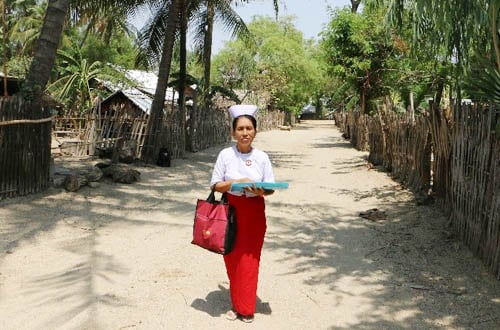Yangon - It was almost midnight when she arrived at the village where she would work as a midwife for the next year. The car left her in the middle of the village. Alone, she was a stranger there. In the pitch black, she could barely make out the outlines of the houses. She went to a nearby house, and knocked. The house owners woke up and when they realized who she was, their faces lit up.
This is how Daw Aye Myint arrived at Htamakaut Village, Seikphyu Township, on the west bank of Irrawaddy, 45 miles south west of Bagan. Daw Aye Myint joined Myanmar Nurses and Midwives Association’s (MNMA) pool of midwives. She is one of seven UNFPA supported midwives deployed to Magway Region. The programme, initiated and supported by UNFPA,trains and deploys professional midwives to post-conflict areas as well as remote areas where basic health care is lacking. UNFPA works closely with MNMA, who have nationwide networks of healthprofessionals who are familiar with the culturally context of the areas in which they work.

Daw Aye Myint received 18 months midwifery training supported by UNFPA, and before she was posted to Htamakaut Village, a five day pre-deployment training in Yangon. It was the first time a health professional had been based in Htamakaut, which has one young auxiliary midwife as well as two community health workers. For the young village auxiliary midwife, Daw Aye Myint provides on the job training and invaluable first-hand experience in providing health care to women before, during and after pregnancy.
Daw Aye Myint is responsible for four villages with a total population of approximately 2,600. Her role is to provide basic healthcare support to pregnant women and newborn children. Daw Aye Myint’salso assists the rural health teams in providing an expanded programme of immunization (EPI). She is very enthusiastic: “The EPI taxes our resources to the limit. We have to coordinate with the village authorities of each village, and ensure that all the families from each village are gathered in the same place on the designated day.”
Dr. Kyaw Kyaw, the township medical coordinator of Siekphyu, is happy about the midwives’ deployment:“They have experience, and can share it with community health workers and auxiliary midwives in the villages. Their value lies in the fact that they can blend in with rural people very easily. They are trusted, and respected. Where they are deployed, we are certain that maternal and infant care improves greatly, thanks to MNMA and UNFPA.”


